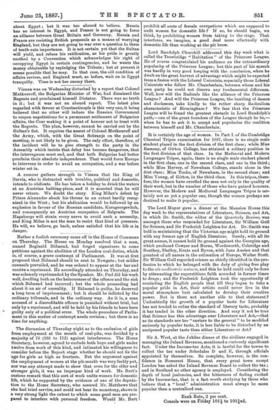The Lord Mayor gave a dinner at the Mansion House
this day week to the representatives of Literature, Science, and Art, in which Dr. Smith, the editor of the Quarterly Review, was amongst those who responded for Literature, Sir William Gull for Science, and Sir Frederick Leighton for Art. Dr. Smith was bold in maintaining that the Victorian age might hold its ground with any former age of English literature. Surely, with all its great names, it cannot hold its ground against the Georgian age, which produced Cowper and Burns, Wordsworth, Coleridge and Southey, Shelley, Keats and Byron, with Jane Austen and that greatest of all names in the estimation of Europe, Walter Scott. Sir William Gull regarded science as chiefly identified in the pro- fession to which he belonged with the duty of giving free play to the vie medicatrix nature:4 and this he held could only be done by attenuating the superstitions faith accorded in former times to drugs ; and Sir Frederick Leighton took the opportunity of reminding the English people that till they began to take a popular pride in Art, their artists could never live in the moral atmosphere best calculated to develop their creative power. But is there not another side to that statement ? Undoubtedly the growth of a popular taste for Literature has not tended to refine the standard of literary taste, probably it has tended in the other direction. And may it not be true that Science has this advantage over Literature and Art,—that as its standards are too "caviare to the general" to be modified seriously by popular taste, it is less liable to be disturbed by an unripened popular taste than either Literature or Art?


































 Previous page
Previous page